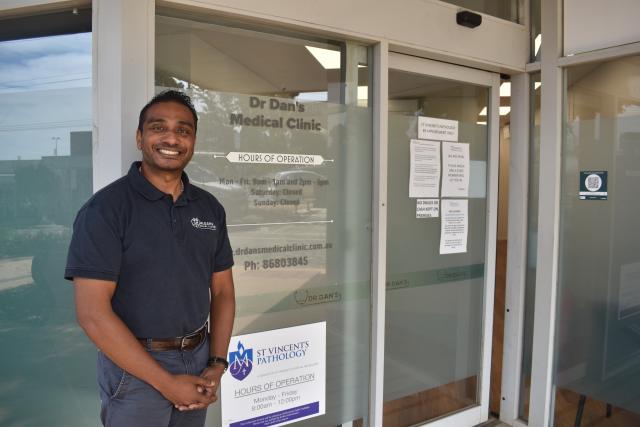
By Callum Ludwig
The Casey electorate has featured as a surprising outlier among concerning statistics as the number of bulk-billing GPs plummets around the country again.
Data from healthcare comparison directory Cleanbill’s Blue Report released at the start of January identified that 132 out of the 151 Federal electorates recorded a decrease in bulk billing offerings between the 2024 report and Cleanbill’s Health of the Nation report in April 2023.
Not in Casey however, as the electorate recorded an increase of three bulk-billing practices, taking the total from a dire four to a still concerning seven.
Dr Dan’s Medical Clinic in Monbulk has continued to offer bulk billing since opening at the start of 2020, despite a tough period where the clinic couldn’t accept new patients, and principal practitioner Dr Dan Jeyaseelan said that won’t be changing anytime soon.
“Even though there is pressure on businesses, there’s so much pressure on families due to the cost of living crisis that maintaining equitable healthcare I think is a pillar of what a modern society should be, so that’s why we’ve kept it,” he said.
“I think it’s crucial because a lot of people are ending up in an emergency room and so on because they cannot get access to quality health care, so I’m glad to see that the numbers of bulk-billing clinics locally have increased.”
The increase in bulk billing clinics in Casey means 18.4 per cent of the clinics in the electorate now offer bulk billing, compared to 11.8 per cent in 2023. It was the third-largest increase recorded in the country.
Dr Jeyaseelan said people need access to quality care, otherwise they delay care.
“If they delay care, then what happens is they end up with delayed presentations which are often much more significant,” he said.
“I really think maintaining bulk billing at least for standard consultations will reduce a lot of the pressure and improve total health outcomes because, through Covid, virtual medicine has sometimes meant that people have not been seen face-to-face at all.”
From November 2023, the Australian Government tripled the incentives for GPs to bulk bill children under 16, pensioners and other concession cardholders to help reduce the cost of a visit to the GP for these demographics.
Dr Jeyaseelan said this change was the one they were waiting for.
“Interestingly, when you do bulk bill someone with a pension or healthcare card now, obviously we’re getting paid a little bit more for it but we can use that to offset bulk billing someone who doesn’t, though that’s not to say those people who don’t qualify don’t have their own financial concerns,” he said.
“These are all individual business choices, we’re passionate about maintaining bulk billing but some places, depending on their viewpoints, will be looking at different strategies to maintain the buoyancy of their practice, it is a challenging time for general practice,”
“The key is Medicare and improving rebates to then improve access and then hopefully those clinics will follow suit, but I don’t think there’s a simple solution.”
The bulk billing incentive that kicked in back in November increases with the rurality of the practice, ranging between $6.85 to $20.65 in metro areas and from $13.15 to $39.70 in very remote areas, and is paid on top on top of the Medicare patient rebate for a GP consultation.
Casey MP Aaron Violi said the improvement in Casey is positive news and a step in the right direction.
“With an electorate that’s 2500 square kilometres, there’s a lot more that needs to be done, there’s no bulk billing in Lilydale for example, one of our larger suburban areas,” she said.
“I am planning to engage with local GPs around understanding the positive effect of the changes and discuss what more can be done because it is good for us, but we need to recognise, is around 1.2 million Australians avoided seeing a doctor last year due to due to the cost,”
“When we have people not going to the doctor because they can’t afford it there are short-term, medium and long-term implications for their health which ultimately cost the system more, but more importantly, there is a significant impact on their quality of life, their family’s quality of life and it ultimately impacts our whole community.”
Mr Violi said he was also concerned about the Victorian Government’s changes to the payroll tax that will now impact GPs, which has also concerned the Federal Health Minister Mark Butler, and the reduction of subsidised mental health sessions from 20 to 10, which he believes both would help to reduce the strain on the healthcare system.






